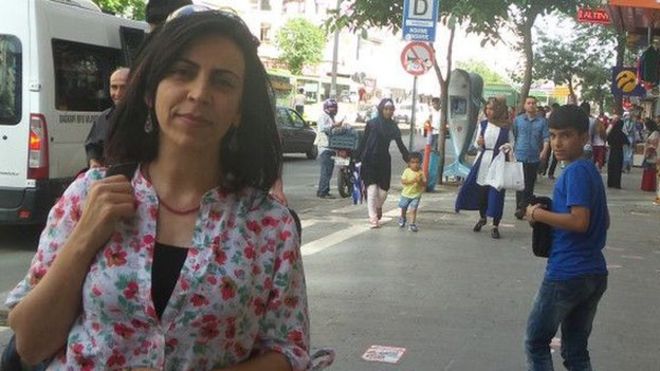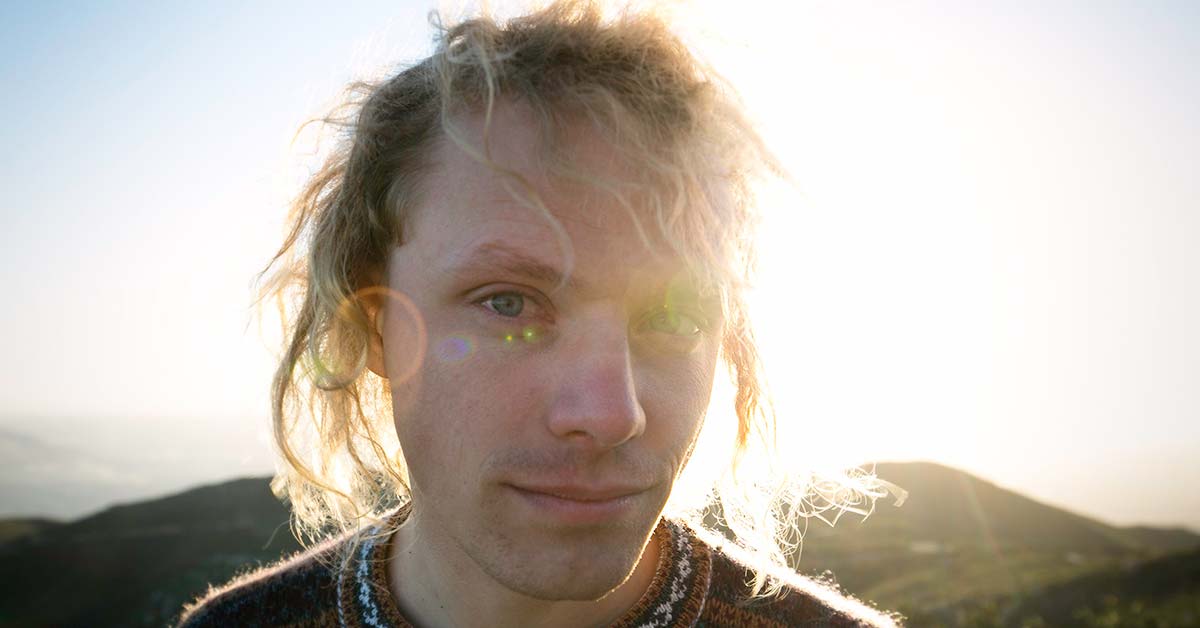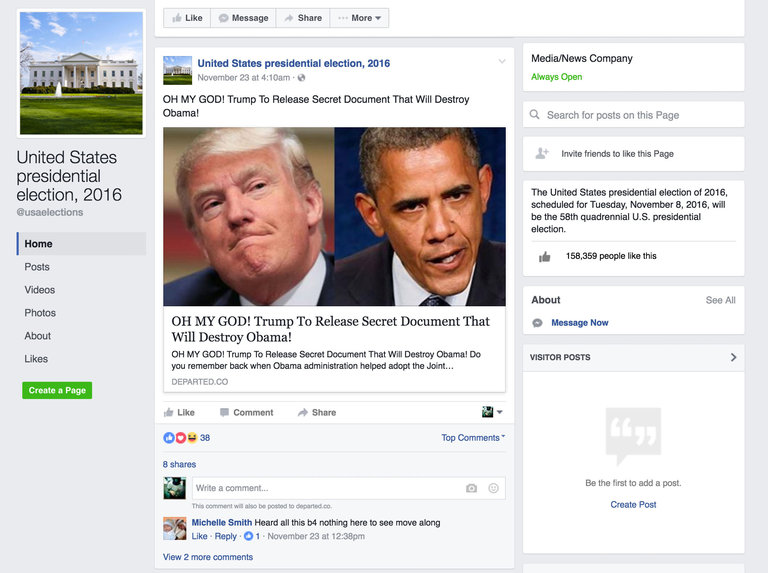2 Dec 2016 | Mapping Media Freedom
[vc_row][vc_column][vc_column_text]Each week, Index on Censorship’s Mapping Media Freedom project verifies threats, violations and limitations faced by the media throughout the European Union and neighbouring countries. Here are five recent reports that give us cause for concern.

Hatice Kamer (Photo: BBC)
Hatice Kamer, also known as Khajijan Farqin, is a freelance journalist for BBC Turk and Voice of America. She was detained in Diyarbakir on 26 November while reporting on a landslide that killed at least ten workers in a copper mine.
Kamer was taken into custody in Siirt province at a police checkpoint; reasons for her detention remain unclear. Due to the state of emergency declared in Turkey, even the journalist’s attorney was unable to contact her.
On 27 November Kamer was released after spending a night in jail. She was told she would face charges of supporting the Kurdistan Workers Party (PKK) through her reporting. The journalist states there is no evidence of supporting the outlawed party through her work.
Dutch-American journalist Kevin Roberson, owner of the online news portal Roberson Report, was attacked at an anti-Black Pete demonstration in Utrecht.
Black Pete is a character in Dutch folklore said to be a servant to Saint Nicholas. The character is often portrayed by a white person in blackface and has become subject to controversy in the Netherlands, many claiming the inclusion of the character in Sinterklaas traditions is racist.
At the event, a group of Black Pete defenders emerged, identifying themselves as members of the alt-right movement Nederlandese Volks-Unie (NVU).
One of the members attacked Roberson from behind, hitting him on the head and neck then running away. Roberson posted the video online. The journalist told Mapping Media Freedom that he is fearing for his safety. “My home address is circulating in right-wing social media groups,” Roberson stated, “I don’t feel safe anymore.”
Roberson is pressing charges against the attacker.
On 25 November, Russian TV channel Dozhd reported that two of its correspondents, Sergei Polonsky and Vasiliy Yerzhenkov, were detained by intelligence agencies in the self-proclaimed Donetsk People’s Republic.
Dozhd reported that, “Three employees of the Ministry of State Security were involved in the interrogation. They watched videos and deleted them. They also blocked Polonsky’s phone, broke Yerzhenkov’s phone and destroyed his notebook.”
Polonsky stated that they did not receive physical abuse, only psychological. The reporters were told that the reason for their detention was “false information” in their accreditation, but Polonsky proved that the information was correct.
Yerzhenkov and Polonsky were in the region to interview Alexey Khodakovsky after receiving permission from the Security Service of Ukraine and the ministry of the Donetsk People’s Republic.
The two reporters are now banned from entering the area after giving “biased” and “provocative” reports on Donetsk.
At a rally for the main Macedonian opposition party, the Social Democratic Union of Macedonia (SDSM), a TV journalist and cameraperson for the Macedonian TV channel MTV 1 were insulted by party supporters.
In Tetovo, this was not the first time an incident like this occurred. “We would like to emphasise that this is not the first time our journalists have been insulted during an SDSM rally,” an MTV 1 report stated, “Our journalists are being blocked from fulfilling their professional duties.”
The reporters were harassed, insulted and spat on as they attempted to report from the rally. The SDSM condemned the incident, saying they were against any negative treatment of the media regardless of its beliefs.
A film crew for REN TV in Moscow was assaulted after investigating fraud at a candle company. According to the clients, the company was offering candle-making lessons which clients would pay for, but the company would take the money and leave the clients without lessons.
While speaking to the director of the company, the crew was attacked by him after he blocked one of the cameramen and pushed reporter Dariya Ermakova to the ground. The incident was caught on video by one of the other cameramen.
Ermakova filed a report to the police who are currently investigating. [/vc_column_text][/vc_column][/vc_row][vc_row][vc_column][vc_column_text]
Click on the bubbles to view reports or double-click to zoom in on specific regions. The full site can be accessed at https://mappingmediafreedom.org/
[/vc_column_text][vc_basic_grid post_type=”post” max_items=”4″ element_width=”6″ grid_id=”vc_gid:1480680872724-f03c210d-ad9e-2″ taxonomies=”6564″][/vc_column][/vc_row]
1 Dec 2016 | Press Releases

Moddi (Photo: Jorgen Otay)
Free speech campaigners Index on Censorship will host a night of forbidden music on December 7 to raise money for censored artists.
This candlelit evening features songs that have been banned or censored, which will be performed live by award-winning Norwegian musician Moddi to celebrate the launch of his ‘Unsongs’ album — 12 tracks from global artists, including Kate Bush and Pussy Riot. The one-off event will be hosted in the restored Hoxton Hall, one of the East End’s hidden Victorian gems.
Moddi’s collection unfurls stories of censorship, persecution and repression, such as A Matter of Habit, a song inspired by interviews with Israeli soldiers and which was banned from army radio in 2012.
Also included in the set will be Moddi’s version of Punk Prayer, which gained international notoriety after Russian feminist punk band Pussy Riot staged a performance of the song at Moscow’s Cathedral of Christ the Saviour. The group said it was a protest against the Orthodox church’s support for Russia’s President Vladimir Putin. Three members of the group were sentenced to two years in prison for “hooliganism motivated by religious hatred”.
Earlier this month Moddi pulled Punk Prayer from his set at a festival in Finnmark, Norway’s northernmost county on the border with Russia, after Russia’s Consulate General in expressed concerns about the song being performed.
‘Forbidden Songs’ is a festive fundraiser in support of freedom of expression charity Index on Censorship, which champions musicians, artists and others around the world who are facing censorship and repression. All proceeds from the night will go to support Index’s Freedom of Expression Awards Fellowship supporting persecuted artists, journalists and campaigners.
Previous award winners include hip-hop artist Smockey, from Burkina Faso, whose studio has been repeatedly targeted for attack because of his involvement with a campaign for democratic reforms that ousted the country’s long-serving and dictatorial president.
Tickets for the event are £15 and include a free drink courtesy of Flying Dog Brewery.
For more information or to arrange an interview, please contact Helen Galliano [email protected]
Notes to Editors
What the critics say about Moddi:
“Making banned music dangerous once again.” The Independent
“An eye-opening lesson in the importance of music” Mojo
“A brave, thought-provoking, musically adventurous project” The Quietus
“Music still has the power to confront authority” The Guardian
“Witty and spry” Financial Times
Index on Censorship campaigns for and defends free expression worldwide. We publish work by censored writers and artists, promote debate, and monitor threats to free speech. We believe that everyone should be free to express themselves without fear of harm or persecution – no matter what their views.
www.indexoncensorship.orgModdi & Unsongs
Unsongs is a remarkable collection of songs that have, at one stage, been banned, censored or silenced. The attempts to suppress them were as mild as an airplay ban and as brutal as murder. With great sensitivity and imagination, Norwegian singer-songwriter Moddi has given them new life and created a moving and eye-opening album. Unsongs simultaneously celebrates the censored and exposes the censors.
1 Dec 2016 | European Union, News and features
[vc_row][vc_column][vc_column_text]
Social media is all atwitter these days with the unremarkable discovery that people lie.
So much so that Oxford Dictionaries has designated “post-truth” as its international word of the year. For those of you not hip to the jargon, it means “relating to or denoting circumstances in which objective facts are less influential in shaping public opinion than appeals to emotion and personal belief.”
In other words, facts don’t count.
Perhaps spawned by the spate of alleged news stories made up out of whole cloth during the recent presidential election in the United States, people of all stripes are weighing in on the issue du jour: How can we ensure that what we read on Facebook or Twitter is real?
I ask, “Why bother?”
Consider the Ninth Commandment (or Eighth, at least as interpreted by Catholics and Lutherans): “Thou shalt not bear false witness against thy neighbour.”
That sounds like a dire warning against lying, which was something that must have been quite popular during the day, and still is. Besides going to hell, most every country in the world has libel laws designed to compensate people whose reputations have been damaged by lies.
But today the allegation of lying seems to be taking on more sinister effects. There have been some allegations that false news stories actually swung votes in the US presidential election. If so, why is “fake news” so effective? I believe we can go back to Lord Mansfield’s 18th century dictum “the greater the truth, the greater the libel” for some insight. Whether we just want to believe something is true or we pick and choose our truths to match our political cloth, we find ourselves in an era where we can scan a headline, read the lede and say, “That seems believable enough.”
Thus, manufacturing stories out of thin air has become a cottage industry and an apparently successful one.
Trying to get on the perceived “right side” of the issue, it comes as little surprise that social media companies such as Facebook are engaged in damage control, saying they are trying out new versions of their algorithms to weed out postings that are simply made up.
And to that I again ask, “Why bother?”
For in fact, doing so may just cause greater harm to free expression than any lie, no matter how damaging.
Because besides the difficulty in determining truth from opinion to a bald-faced lie, the inherent limiting of ideas, including criminalising them, makes us all suffer a little bit.
Today we are seeing criminal and administrative prosecution for activities on social media platforms that involve responding to existing content (i.e. sharing, re-posting, uploading, liking, quoting and commenting) and that contributes to an environment of fear.
Combine this with the growing tendency for nations to apply anti-extremism and anti-terrorism laws to content on social media platforms and the result is social media users, including members of the media, are being fined, arrested and imprisoned for interacting or reacting to content produced by third parties or for expressing their opinions on it.
This is censorship and can lead to self-censorship.
Instead, issues related to social media activities should be addressed exclusively through self-regulation, education and literacy, not through new restrictions.
As the Representative on Freedom of the Media for the Organization for Security and Co-operation in Europe, I recently recommended that the participating states that comprise the body to recognize the following:
- That no one should be penalised for social media activities that come as a reaction or interaction with existing content;
- That no one should be penalised for the social media activities such as posting and direct messaging unless they can be directly connected to violent actions and satisfy the test of an “imminent lawless action”;
- That no one should be held liable for content on social media platforms and on the internet of which they are not the author, as long as they do not specifically intervene in that content or refuse to comply with court orders to remove that content, where that have the capacity to do so (“mere conduit principle”);
- The necessity to decriminalise defamation, insult and blasphemy;
- That any imposition of any sanctions imposed by courts of law, especially when it comes to social media activities, should be in strict conformity with the principle of proportionality;
- The need for education and literacy on freedom of expression on the internet.
Let’s not overreact to the wave of fake news by building another wall around the internet.
Dunja Mijatović is the Representative on Freedom of the Media for the OSCE, based in Vienna.[/vc_column_text][/vc_column][/vc_row][vc_row][vc_column][vc_basic_grid post_type=”post” max_items=”4″ element_width=”6″ grid_id=”vc_gid:1480348630223-46408dc4-0b68-7″ taxonomies=”6380″][/vc_column][/vc_row]
30 Nov 2016 | Index in the Press
One of IWPR’s long-term contributors from Kazakstan, Gaziza Baituova, has been nominated for the Index on Censorship Journalism Award 2017. Read the full article



